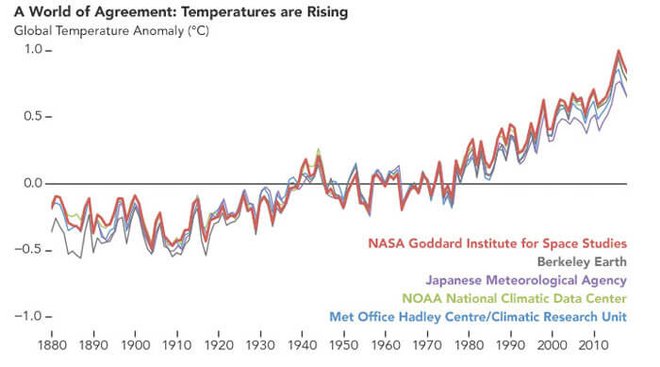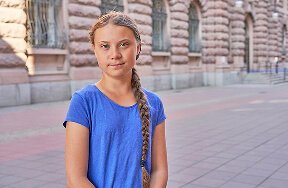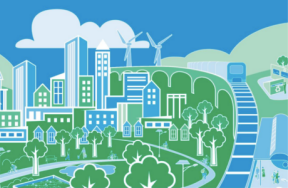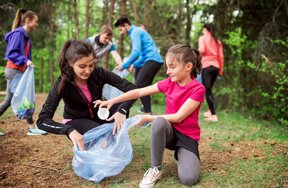The Effects of Climate Change - Facts on the Climate Crisis
How will it affect you? Can you make a difference?
Oct 03, 2019You may have heard talk about the climate crisis swirling around. Some of it may be confusing. Some of it may be scary. Some talk may dismiss it, and some may make you feel so overwhelmed that it seems there’s nothing you can do about it.
This issue affects the whole earth and everyone on it, so it’s good to focus on the facts brought forth by reputable scientists and organizations. Knowing that you have the correct knowledge will help you feel empowered to create change, because one person can make a difference.
 Greenhouse gases get trapped in our atmosphere, warming our planet.
Greenhouse gases get trapped in our atmosphere, warming our planet.
Look at 16-year-old Greta Thunberg. She started out as one lone voice sitting outside a government building, asking for change. One year later, on September 20, 2019, she led about 4 million people from 161 countries in the largest climate strike in history. Many of these people were kids. She gave a speech to world leaders at the UN Climate Action Summit and has become one of the most well-known faces of climate-change activism. "My message to young people who want to have an impact on the world is to be creative," Thunberg said. "There's so incredibly much you can do and do not underestimate yourself."
 Greta Thunberg speaks during a joint hearing before the House Foreign Affairs Committee and the House Select Committee on the Climate Crisis in Washington, DC, September 18, 2019.
Greta Thunberg speaks during a joint hearing before the House Foreign Affairs Committee and the House Select Committee on the Climate Crisis in Washington, DC, September 18, 2019.
Why is climate change such a big issue right now?
Scientists have been warning us for decades that the earth is warming up. Almost all climate scientists agree that the rapid global warming from the last 100 years is because of human activity—increased carbon dioxide and man-made emissions in the atmosphere.
We produce a massive amount of waste and burn fossil fuels for energy. These create greenhouse gases that get trapped in our atmosphere, warming our planet. Trees absorb carbon dioxide, but many have been cut down to make way for factories, roads and farms. Rainforests are disappearing. There is more carbon dioxide in the air today than at any point in the last 800,000 years.
 Global warming is caused by increased carbon dioxide in the atmosphere, largely from fossil fuels
Global warming is caused by increased carbon dioxide in the atmosphere, largely from fossil fuels
Here’s what’s happening as a result:
Glaciers and ice sheets are shrinking, and oceans are warming and rising. This causes flooding, landslides and avalanches, and will especially affect coastal areas.
Weather is becoming more extreme. There are more droughts, heat waves, heavy rains, wildfires and violent storms. This could threaten our communities, food and water supply.
Climate change is shifting seasons and destroying habitats. As a result, some insects, plants and animals face extinction. Future generations may see polar bears, penguins, seals, orangutans, apes and sea turtles only in picture books. Scientists predict that 90% of the world’s coral reefs will eventually be gone. Marine life can’t survive in warmer, more acidic water.
 Future generations may see polar bears, penguins and seals only in picture books.
Future generations may see polar bears, penguins and seals only in picture books.
The climate is changing. As humans, we need to learn to adapt to this. We also need to act now, because doing nothing will make it worse. It’s not too late for us to help fix this crisis. We can reduce our emissions and stabilize greenhouse gas levels by choosing cleaner ways to power our homes, cars and businesses. Through the little choices we make every day, we can reduce our carbon footprints, creating real change.
 Rapidly-shrinking glaciers can cause massive flooding and coastal damage.
Rapidly-shrinking glaciers can cause massive flooding and coastal damage.
What can I do, you say? Here are just some of the ways:
- Walk or bike instead of using a car, or carpool. Even a two-mile car trip puts two pounds of carbon dioxide into the atmosphere! Go inside a restaurant instead of sitting in a drive-thru line.
- Turn off lights, computers and other electronics when you’re not using them. Plug electronic devices into power strips and turn them off when they’re not in use.
- Recycle. If your community doesn’t have a recycling service, find out who you can talk to about starting one. What can be recycled? Papers, aluminum cans, cardboard, food cans, plastic, glass, newspapers, magazines, junk mail, phone books, and anything else made of paper.
- Don’t waste food.
- Eat less meat. Choose alternative sources of protein.
- Take shorter showers. Don’t keep the water running when you’re brushing your teeth or washing the dishes.
- Plant a tree.
- Think of new ways to reuse things. Give an old toy to a child instead of throwing it in the trash.
- Close doors immediately so heat doesn’t escape.
- Use a refillable water bottle instead of buying plastic bottles of drinks.
 Plant a tree. Trees absorb carbon dioxide.
Plant a tree. Trees absorb carbon dioxide.
Suggest to others around you what they can do. For example, you can ask your parents to:
- Turn the car off when they’re waiting to pick you up at school.
- Use energy-saving lightbulbs.
- Learn about starting a compost bin in your backyard.
- Use energy-efficient appliances.
- Bring reusable grocery bags to the store.
- Reduce their use of plastic bags and straws. A recent study reports that there will be more plastic than fish in the world’s oceans by the year 2050!
- Use a reusable sandwich bag for your lunch sandwiches instead of plastic bags.
- Choose Fair Trade food products. These products help make sure farmers are paid fairly, reducing the chances that they will use chemicals that hurt the environment.
 Scientists agree that the rapid global warming from the last 100 years is because of human activity.
Scientists agree that the rapid global warming from the last 100 years is because of human activity.
Solving climate change is one of the world’s biggest challenges. Change needs to happen at every level. Individuals, families, communities, companies and governments will need to come together and do their part. Real change will start with people like you! Be an inspiring example for others to follow. Get a good education and keep learning about how our climate is changing so that you can make responsible decisions. Consider ideas about how we can use clean energy. You can even consider choosing a “green career,” one that helps solve the crisis. These will be the jobs of the future!
Share With Kidzworld
What are your thoughts about climate change? Which of these ideas are you most likely to try? We want to know!

































